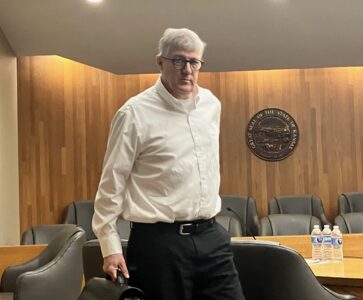Pinckney Elementary School is named after a slave owner, but Black school leaders suggest there are bigger issues to address

photo by: Chris Conde/Journal-World File Photo
Pinckney Elementary School, 810 W. Sixth St., is pictured in this Journal-World file photo from Sept. 15, 2018.
Despite Lawrence’s abolitionist past, a local elementary school happens to bear the name of an early U.S. political leader who was not only a slave owner but an advocate for keeping the slave trade legal in the United States.
While Pinckney Elementary School was not formally named in honor of Charles Pinckney, a former governor of South Carolina and one of the delegates who crafted the U.S. Constitution, the fact has led to a Journal-World reader calling for changing the school’s name in a recent letter to the editor.
However, two Black school district leaders said they don’t believe the school’s name is a pressing issue at the moment, as communities across the country — including Lawrence — are currently going through social upheaval in an attempt to address systemic racism and police brutality.
Lawrence school board President Melissa Johnson said she was not sure why the name of the school was even a relevant topic, as there are more important issues related to racism that need to be addressed.
“I’ve heard far more individuals (note) changing the school name will not save Black folks from dying or being treated unjustly,” Johnson said in an email to the Journal-World. “Let’s focus on changing the present and future first, in my opinion.”
But the Lawrence school district may take action. District spokeswoman Julie Boyle said the district plans to discuss the issue with the Pinckney community in the fall.
“We appreciate the author of the Letter to the Editor and the newspaper bringing this to our attention,” Boyle said.
Charles Pinckney and the Pinckney School
Charles Pinckney, who lived from 1757 to 1824, served the state of South Carolina as a governor, U.S. representative and senator.
Along with his political career, he also owned Snee Farm in southern South Carolina, a plantation that used slaves. A portion of the farm has been preserved as the Charles Pinckney National Historic Site, which is operated by the National Park Service.
But Pinckney may be best known as one of the signers of the U.S. Constitution, which was ratified in 1788. During the crafting of the founding document, Pinckney made his position on slavery clear. While serving as the delegate for South Carolina in the discussions, Pinckney argued his home state would not support the Constitution if it outlawed the slave trade, according to the National Park Service.
He tried to bolster his argument by noting slavery had always existed.
“If slavery be wrong, it is justified by the example of all the world. In all ages, one half of mankind have been slaves,” Pinckney said, according to the National Park Service.
So how did a school in Lawrence gain the name of a slavery advocate? According to the school district, the original Pinckney School facility, which was constructed between 1871 and 1872, was named after the street it was located on. That street is now known as Sixth Street.
But the specific reason the street was named after Pinckney is not clear, said Steve Nowak, executive director for the Watkins Museum of History. Many of the streets in Lawrence at one point were named after early political leaders, but they have since been renamed. Pinckney Street was renamed Sixth Street sometime in the early 1900s, according to the school district.
While it may seem strange for a city so closely tied to the abolitionist movement to name a street after a slave owner, Nowak said Lawrence’s founders may not have seen the nation’s history of slavery in the same way as residents do now.
“I am guessing that Lawrence’s founders, even though they opposed the spread of slavery, may have had somewhat different attitudes than we do today about the nation’s slaveholding past,” Nowak said in an email. “Those attitudes increased as time progressed and the Civil War approached.”
Nowak also noted Lawrence’s town plan was originally laid out in Boston, which also has a street named for Pinckney.
“I expect ’13 original colonies’ trumped ‘slave state’ in our founders’ minds,” Nowak said. “We may find the attitudes of people 150 years ago shocking now, but they did not view history through the same lens as we do.”
Name change?
That history could become an issue today, though. At least one Lawrence resident believes the name of the school should be changed.
Gary M. Smith, who noted he does not live in the Pinckney neighborhood, recently wrote to the Journal-World in a letter to the editor calling for the school’s name to be changed.
“I’ve often wondered if it doesn’t bother other Lawrencians how after all these post-Civil War years — after all these Free State Lawrence post-Civil War years — we’d still put up with one of our favorite neighborhoods in Lawrence being named in honor of one of the most wicked racists in history, Charles Pinckney,” Smith wrote.
Such name changes have occurred elsewhere throughout the country, including at state universities where campus buildings and programs are named after proponents of slavery. One example, in Pinckney’s home state, is Clemson University.
Clemson leaders recently voted to strip the name of John C. Calhoun from the university’s honors college, according to the Associated Press. Calhoun was a slavery proponent who also served as the university’s vice president. The Clemson trustees said one of the catalysts for the change was the recent death of George Floyd in Minneapolis police custody, which has led to protests across the country over systemic racism and police brutality.
Bigger issues
While one resident has publicly called for a name change, that does not necessarily mean it’s a pressing issue. Johnson specifically noted it does not appear to be one among Lawrence’s people of color.
Instead, she said the community should be focused on bigger issues, such as addressing systemic racism.
“My thoughts are first and foremost why is this even relevant?” Johnson said in an email to the Journal-World. “The Black and Brown community is not focused on this because it is not a priority at this time. The focus should be on what’s happening now.”
Johnson specifically pointed to the pending murder case against Rontarus Washington Jr., a Black man who has been in the Douglas County Jail for more than five years. Washington currently is being held on a $750,000 bond, an amount Johnson thinks is too high. The Journal-World previously reported that in order to bond out, Washington would presumably have to pay $75,000 up front.
Washington’s trial has faced delays for multiple reasons, sometimes for issues raised by the prosecution but other times at the request of Washington’s defense team. He has waived his right to a speedy trial, in part to give his defense team time to gather evidence.
Protesters recently interrupted a meeting of the Lawrence City Commission and made expletive-laden demands for Washington to be released; the City Commission does not have any authority over the jail or Washington’s trial.
Johnson also pointed to the recent resignation of Lawrence Police Chief Gregory Burns Jr., who is Black, after the local police union gave him a vote of no confidence earlier this year. The union’s reasoning behind the vote has remained unclear, the Journal-World has reported; Johnson said the community should want to know the exact details behind the vote and Burns’ resignation.
“The focus should be on holding institutions accountable for their systemic racism first and foremost,” Johnson said.
Erica Hill, who is also a Black school board member, said slavery is a dark part of U.S. history, but it is still history. She said slavery must be acknowledged, and it cannot be changed or erased.
Hill said the name of the building is not a pressing issue at the moment and the focus of the school district should continue to be providing education to all students. But she noted she would be open to a conversation on the topic if it is important to the community.
“Enslaved people were dehumanized and denied basic human and constitutional rights, specifically education,” Hill said in an email. “We have an opportunity to provide high quality education to the students in our community — that should be our focus.”
Hill said the community should use the current momentum seen across the country to further invest in its students.
“Racism is a moral issue,” she said. “It’s going to take a significant amount of work to make a difference that’s sustainable for the future generations to carry forward.”
Contact Dylan Lysen
Have a story idea, news or information to share? Contact reporter Dylan Lysen:
- • dlysen@ljworld.com
- • 785-832-6353
- • Twitter: @DylanLysen
- • Read other stories by Dylan







